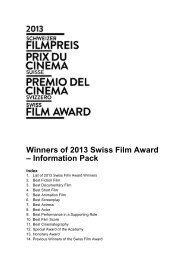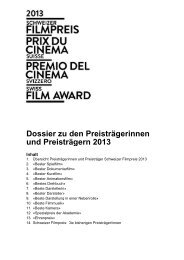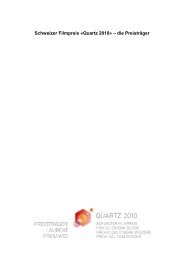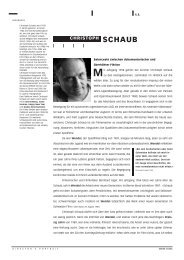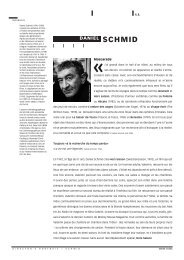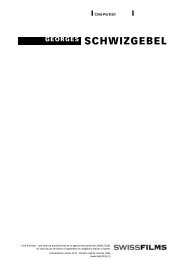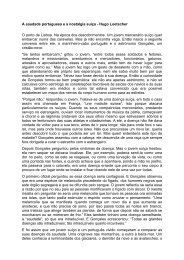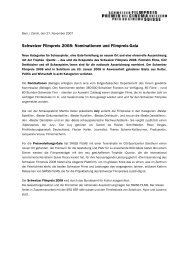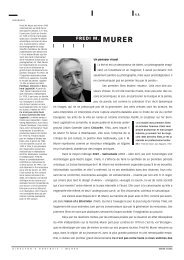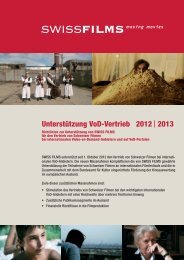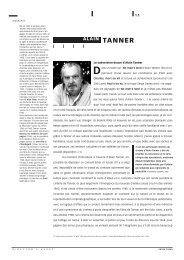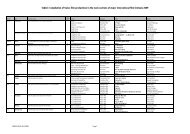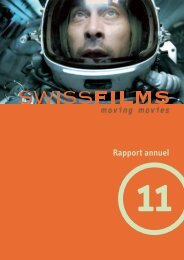Director's Portrait Fredi M. Murer - Swiss Films
Director's Portrait Fredi M. Murer - Swiss Films
Director's Portrait Fredi M. Murer - Swiss Films
Create successful ePaper yourself
Turn your PDF publications into a flip-book with our unique Google optimized e-Paper software.
Script: <strong>Fredi</strong> M. <strong>Murer</strong><br />
Camera: Pio Corradi<br />
Sound: Florian Eidenbenz<br />
“In Alpine Fire, <strong>Fredi</strong> M. <strong>Murer</strong><br />
presents a film that is more than<br />
just a repetition or a reworking of<br />
his earlier attempts, more than just<br />
an advance on those earlier works;<br />
it is in fact the sum of everything<br />
that the film-maker, in more than<br />
twenty years of resolute, uncompromising<br />
work, has achieved:<br />
a complete film. This film by the<br />
45-year-old poet of the New <strong>Swiss</strong><br />
Cinema is, without doubt, the most<br />
sumptuous and vibrant <strong>Swiss</strong> film<br />
of the year. Along with Tanner’s<br />
Jonas, Yersin’s Les petites fugues<br />
and Imhoof’s The Boat Is Full, it will<br />
go down as one of the most important<br />
post-war films to come out of<br />
Switzerland.”<br />
Cinema 31, 1985<br />
1985 35mm colour 117’ Höhenfeuer<br />
T<br />
F I C T I O N F I L M / M U R E R<br />
Editing: Helena Gerber<br />
Music: Mario Beretta<br />
Cast: Rolf Illig, Dorothea Moritz,<br />
he first sketch of Alpine Fire was conceived – as one episode in a multi-episode film on the<br />
subject of sexuality that was never made – in 1979, six years before it was shot. But after<br />
Zones he seriously doubted his ability to direct actors, so he took some time out from his creative<br />
endeavours, earned a living as an editor and attended a drama course with Lee Strasberg. A six-<br />
month stay in Iceland restored him to the right of frame of mind, and, on his return, <strong>Murer</strong> devel-<br />
oped the sketch into a fifteen-page narrative. At that time, he wanted to try his luck as a screenplay<br />
writer; he also intended for the film to be set in the isolation of Iceland. However, financing and<br />
production constraints brought the project back to Switzerland and, in the end, <strong>Murer</strong> himself also<br />
directed the film. The film is a tale of incest played out on a remote <strong>Swiss</strong> mountain farm located<br />
just below the tree line. This is where the boy, who was born deaf and remains nameless for the<br />
duration of the film, lives together with his elder sister, Belli, his father and his mother. The family<br />
keeps itself to itself. They have no eye contact with their nearest neighbours and the walk to Mass<br />
or to the market in the village in the valley means a whole day’s outing. The boy has been sent high<br />
up into the mountains by his father to clear the ground of rocks. When Belli visits her brother in his<br />
isolation, the two become lovers. Back on the farm, the siblings live alongside their parents, keep-<br />
ing their love a secret, until Belli’s pregnancy betrays her and a tragedy becomes inevitable. Alpine<br />
Fire was awarded the Golden Leopard at the 1985 Locarno Film Festival and is <strong>Fredi</strong> M. <strong>Murer</strong>’s<br />
most successful film to date. It is impressive for its ethnological accuracy, the silent beauty of the<br />
mountain landscape and above all – in common with all of <strong>Murer</strong>’s films – for its polished, dense,<br />
“natural” soundtrack.<br />
Johanna Lier, Thomas Nock,<br />
Jörg Odermatt, Tilli Breidenbach<br />
Production: Bernhard Lang AG<br />
World Rights: Bernhard Lang<br />
Original Version: <strong>Swiss</strong>-German<br />
ALPINE FIRE<br />
SWISS FILMS



